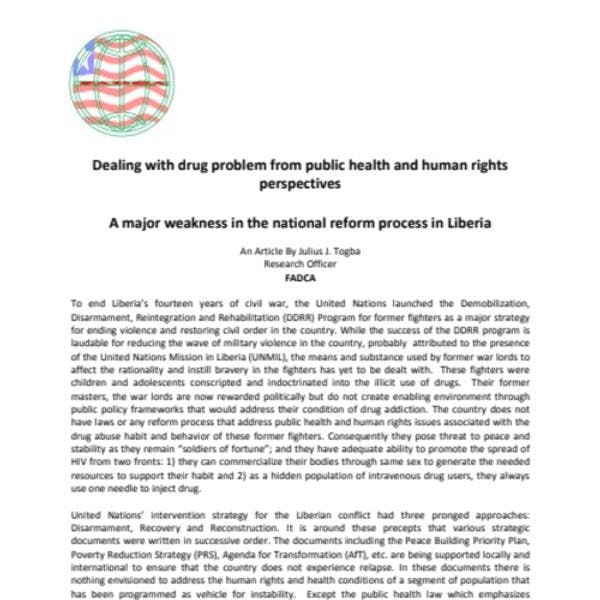Dealing with drug problem from public health and human rights perspectives in Liberia
To end Liberia’s fourteen years of civil war, the United Nations launched the Demobilization, Disarmament, Reintegration and Rehabilitation (DDRR) Program for former fighters as a major strategy for ending violence and restoring civil order in the country. While the success of the DDRR program is laudable for reducing the wave of military violence in the country, probably attributed to the presence of the United Nations Mission in Liberia (UNMIL), the means and substance used by former war lords to affect the rationality and instill bravery in the fighters has yet to be dealt with. These fighters were children and adolescents conscripted and indoctrinated into the illicit use of drugs. Their former masters, the war lords are now rewarded politically but do not create enabling environment through public policy frameworks that would address their condition of drug addiction. The country does not have laws or any reform process that address public health and human rights issues associated with the drug abuse habit and behavior of these former fighters. Consequently they pose threat to peace and stability as they remain “soldiers of fortune”; and they have adequate ability to promote the spread of HIV from two fronts: 1) they can commercialize their bodies through same sex to generate the needed resources to support their habit and 2) as a hidden population of intravenous drug users, they always use one needle to inject drug.
United Nations’ intervention strategy for the Liberian conflict had three pronged approaches: Disarmament, Recovery and Reconstruction. It is around these precepts that various strategic documents were written in successive order. The documents including the Peace Building Priority Plan, Poverty Reduction Strategy (PRS), Agenda for Transformation (AfT), etc. are being supported locally and international to ensure that the country does not experience relapse. In these documents there is nothing envisioned to address the human rights and health conditions of a segment of population that has been programmed as vehicle for instability. Except the public health law which emphasizes criminalization of illicit drug usage punishable by imprisonment without rehabilitation, Liberia does not have any law in her public policy books as a drug reform regime. Consequently anybody caught by state security actors in relation to perceived ‘drug crime’ is sent to prison with little or no legal proceedings. The Bureau of Correction and Rehabilitation which has oversight responsibility for prisoners does not have any rehabilitation program. This is a chain of vulnerability of state resilience and stability.
Keep up-to-date with drug policy developments by subscribing to the IDPC Monthly Alert.
